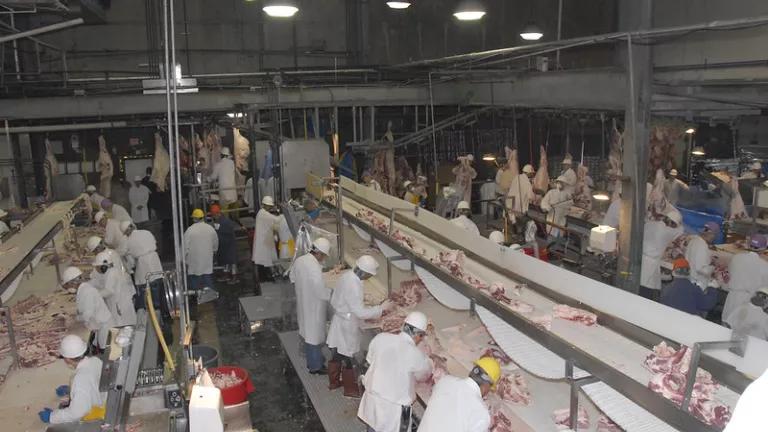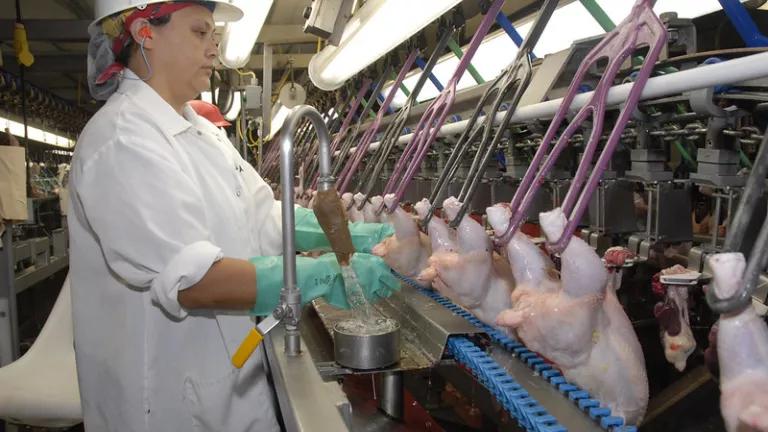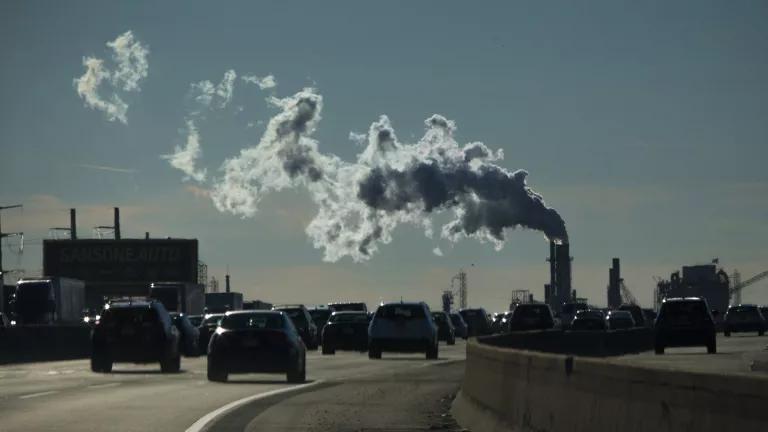Trump Attempts to Shield Big Ag at the Expense of Workers

Learn more about NRDC’s response to COVID-19.
On April 28, Workers’ Memorial Day, at the reported urging of Tyson Foods, President Trump invoked the Defense Production Act (DPA) with the stated goal of keeping meat processing (slaughterhouses) open through the COVID-19 crisis. In doing so, the President is attempting to trample over state decisions intended to improve worker safety while responding to outbreaks of COVID-19 at many slaughterhouses. The President made clear in remarks that the primary aim of the order was to insulate the food giant from liability, not ensure the safety of the food supplies or the workers who produce it. Adding insult to injury, this comes as calls to use the DPA to ensure health workers have access to adequate personal protective equipment (PPE) go unheeded. These actions are callous and dangerous.
The top COVID-19 hotspots nationwide are all linked to slaughterhouses with active outbreaks, and there are currently 6,500 slaughterhouse workers with COVID infections or exposure across the nation’s 6,200 facilities. Even in this dangerous sector where workers go to work every day knowing that they face high rates of severe injuries and harsh conditions, workers have been staying home, fearing for their lives; some are walking out protesting this order and related commitments to keep plants open at all costs. Forcing plants to stay open without mandating adequate safety measures is not only dangerous, it also undermines the efforts of localities to force companies to look out for the basic safety of workers.
Simply put: If companies like Tyson, JBS, and Smithfield are not ready to be responsible for the bare minimum of worker safety, then they are not ready to reopen. Our government has a responsibility to make sure that workers—especially those deemed essential or required to work—are protected.
The President’s stated intent to create a liability shield for large meat companies, the likes of which are still taking shape, is particularly troubling. Although there are big questions about whether the DPA actually gives the President the ability to grant widespread immunity to industries, and the scope of the authority to mandate the reopening of plants is similarly questionable, one thing is certain: the order comes amidst waning federal oversight of one of the most dangerous sectors of our workforce and food system. Industry has long touted the consolidation and integration that helped amass corporate power as “efficient,” but they’ve been operating with a dangerous lack of oversight in this era. Ranks of OSHA inspectors are at a 45 year low. There were only 862 inspectors at the beginning of 2020. This month, the government approved a record number of poultry line speed waivers (half for Tyson foods) allowing processing to speed up dangerously, even as the virus spread. Previously, the Trump Administration functionally let the pork producers set their own rules for linespeeds, which is dangerous for workers and consumers.
No workers should have to die on the job to put food on the table. Industry must protect their workers and should not get a blank check to endanger them. In light of these actions from the President and this new Executive Order, the federal government and meat companies must ensure that slaughterhouses are safe for workers.
This means that, at a minimum, workers must have adequate PPE and sanitation, provided at the employer’s expense, not the worker’s. And as I have written before:
- OSHA must set an infectious disease standard, and provide the agency with adequate enforcement mechanisms and staff: Alarmingly, no such standard exists for slaughterhouse workers or others. OSHA has the authority to set this up, but Congress ought to mandate it. Congress also needs to increase OSHA’s ability to enforce the law with stronger penalties and staff to enforce them. Workers and their advocates should have the right to go to court to enforce the law when the government fails.
- Reinstate safer line speeds at slaughterhouses: The Trump Administration relaxed safeguards limiting how fast pork producers could run their slaughterhouse lines. Congress should put an end to this and reinstate safer line speeds.
- Ensure the most vulnerable food system workers, including farm laborers and slaughterhouse workers, have emergency care: Congress can, and should, immediately set up emergency facilities accessible to workers and their families.
- Provide support for industrial meat producers who want to switch to more resilient and sustainable production methods: The National Chicken Council called for federal support for their own contract growers through the CARES Act relief package passed by Congress, but there are proposals in Congress that would support farmers who want to transition out of this system. Congress could take steps to implement some of those plans in response to COVID-19, especially for farmers who lose income as their current supply chains break down. In the immediate-term, a portion of the $9.5 billion CARES Act funding allocated to support farmers, including livestock producers, should be used to assist growers seeking to transition out of the industrial system.
The consolidation of power that has led to corporate chiefs being able to make their own rules—be it through setting their own slaughterhouse line speeds or through the ability to request an Executive Order that the President says aims to give them a special, unwarranted, unprecedented liability shield—has left our whole food system vulnerable from farm to fork. Ultimately, we need a return to a system of agriculture where workers and farmers come before corporate profits. Congress can take steps in this direction now, for example by including dedicated support in future stimulus bills for small and mid-size producers that have lost access to the direct markets on which they rely. Above all, we need a system that puts workers, especially those on the front lines of this crisis, above corporate profits.



